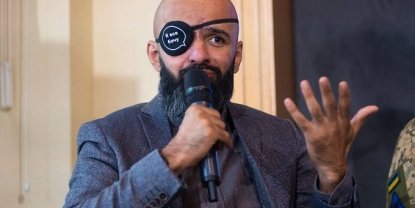A Ukrainian lawyer, public figure and serviceman of the Armed Forces of Ukraine Masi Nayem said to the journalist Anastasia Bagalika why a successful judicial reform would guarantee the return of Ukrainians from abroad and how the corruption chaos in the courts created a demand for the rule of law,
Judicial reform should begin with the reform of law enforcement agencies.
When we discuss changes and reforms, many from the professional society put judicial reform first, at least before the war. Because judicial reform sets the framework in which everyone lives, and it can change a lot in other areas. First, how important is it, and how high is it in priorities? And secondly, how will it affect all the other areas where we need change?
As a lawyer, I know that courts look at materials that are the product of the work of law enforcement agencies. If this product is of poor quality, judicial reform will do nothing.
However, I understand that judicial reform will change when law enforcement agencies collect evidence qualitatively, and there will be no corruption, or it will be minimal. Because zero corruption does not exist.
If the judge knows that it is impossible to bribe law enforcement agencies, then maybe the whole system will change. Therefore, for me, the reform of the judicial system is preceded by the reform of law enforcement agencies, which cannot now collect enough evidence.
Now, there is an entire institution — anti-corruption institutions. But reforms are not occurring in the police or the SSU [n the Security Service of Ukraine - Ed]. The SBI [State Bureau of Investigation - Ed.] is generally a worthless institution that is unable to do anything because it is actually managed manually.
Therefore, if the reforms take place precisely by design when they start with law enforcement agencies, then the judicial reform can really change.
If judicial reform takes place, I am sure that many people will return to Ukraine. Because this is a basic need for security.
When my brother was beaten in the center of Kyiv by three citizens of the Russian Federation, we lost in the original jurisdiction in this case. Because the law enforcement agency did not attach a document that allowed them to collect evidence.
And we warned the prosecutor's office that we could not do this because we would lose in court. They didn't listen. I understand that in this part, I will tell my child that it is dangerous here, and I do not want to live here.
Therefore, I am sure that if the judicial reform can be carried out, many people will return because Ukrainians want to develop Ukraine. They want to use their brains here because this is their native home.
We are not expected anywhere in other countries, no one is happy for us. And this is honest, I know as an emigrant from Afghanistan. And here we want to live, so there are at least basic security needs. And judicial reform is about security.
Chaos in the law enforcement system creates a demand for the rule of law.
I will also ask about law, lawyers, and courts. Maybe it was like that before the war, and maybe it was like that until 2014, and then it started to change, but in society's perception, the courts, lawyers, and law enforcement system are the environments where corruption is the most prevalent. However, I know that among lawyers, there are those driving change, those who, for example, are driving the cleaning of the Supreme Council of Justice. Some lawyers work honestly, and there are more of them lately. Do you think it is because they are ideological? And how do we make sure that the majority are ideological in jurisprudence?
It has finally become clear to many lawyers that the chaos that occurs when power changes, when they are forced to negotiate with someone else, is less convenient and practical than the rule of law. Because the rule of law is the rules that have already been written.
We will be able to be equal, use our brains, and be concretely capable when we are equal, and here, show our brains—what we really are.
For example, when we approach the bench of the Anti-Corruption Court, it is a pleasure. Because in ordinary courts, among three judges, one is necessarily asleep, the other nods his head, and only the third is possibly involved.
Everyone is involved in the Anti-Corruption Court. And we can finally show our expertise, we finally have this principle of competitiveness.
I think that the environment will change only when we talk more about the rule of law rather than justice.
Among our lawyers, as far as I know, this discourse is raised very rarely because even Ukrainian lawyers often confuse justice with the rule of law.
Justice is something subjective. But what we charge, for example, for pro bono cases, creates this request, and then our colleagues also pick up.
And when you do business for free, you definitely know that only your brain wins. Because there is no money there. No one will pay there, and no one here will pay you.
Since 2016-17, when there were attacks on activists, we have been taking pro bono from many activists and defending them. We have created this request.
I now feel that lawyers who know they will have to fight with their brains are coming to the courts.
This chaos was created by politicians in the law enforcement system when it was unknown who was responsible for what and requested that uniform rules be made. I am sure that over time, there will be more and more of it. It is convenient.









